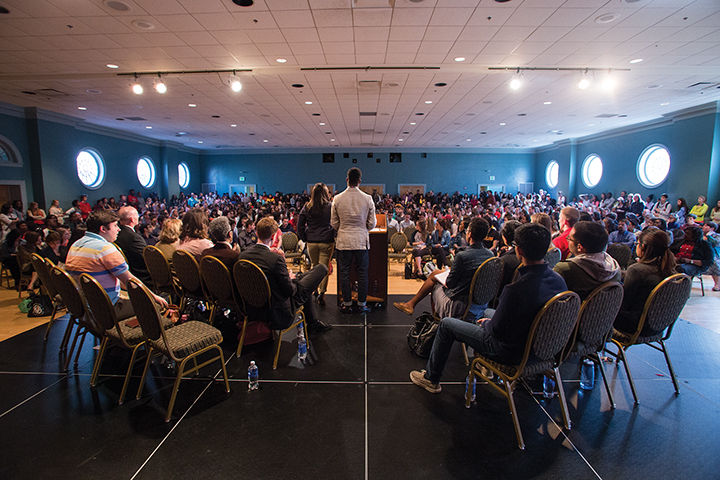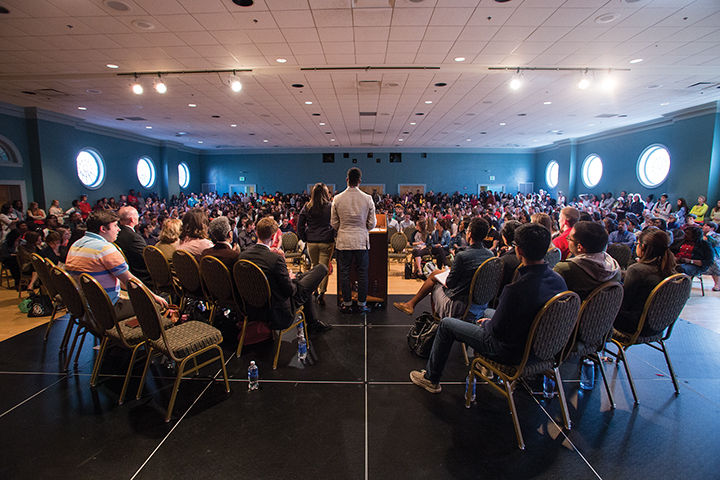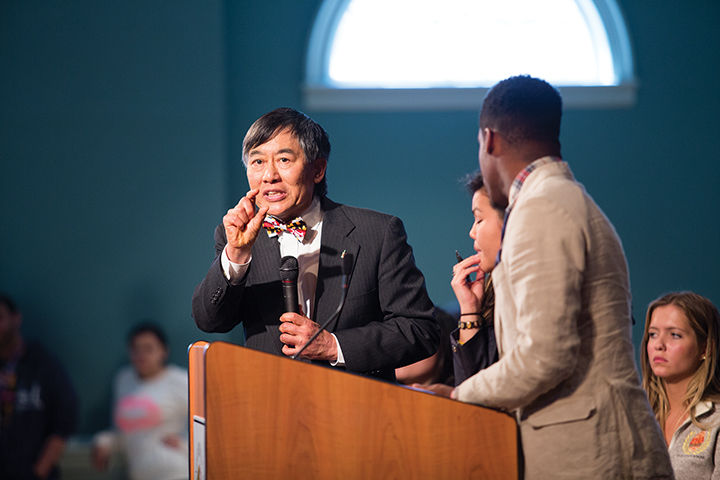One of freshman Stu Krantz’s reasons for joining Greek life was to help bring a change to the culture — and he thought coming to an open forum Thursday about the controversial Kappa Sigma email was one step in that direction.
“I was disgusted [by the email], not just as a fraternity member but as a human,” the finance major and member of this university’s chapter of Zeta Beta Tau said.
More than 250 students gathered in the Colony Ballroom in Stamp Student Union on Thursday afternoon to ask questions of university and student leaders, including university President Wallace Loh, Title IX Officer Catherine Carroll and Fraternity & Sorority Life Director Matt Supple — about the university’s response to the recently surfaced email from a former Kappa Sigma fraternity member that included racist, sexist language.
The Student Government Association and the Office of Multicultural Involvement & Community Advocacy hosted the forum, which addressed the email as well as an email Loh sent Wednesday that stated a university and police investigation found the email did not violate university policy.
“There’s a larger issue and a much more difficult issue, and that is, what are we going to do to make this a better university and change its culture so that these incidents don’t happen again?” Loh said. “It’s not just a change in the culture of that fraternity; it’s a change in the culture of all Greek life, and it’s a change in the culture of the University of Maryland itself.”

Town Hall Meeting
Allowing the student who sent the email to return to the campus next semester is an example of restorative justice — focusing on the needs of the victims and the offenders instead of focusing on the punishment, Loh said.
Supple said in order to take steps to change the culture of Greek life, all Greek organizations will now be required to complete four new training sessions, covering sexual assault, diversity, hazing and alcohol and drug use.
At some points, the discussion grew heated. After a student asked Supple what he would do to reduce the perceived inequality between predominantly white and multicultural Greek organizations, Supple said he did not think there was a disparity. Audience members began to yell, “Bulls—! Bulls—!”
Another student addressed Loh specifically, asking how the phrase “f— consent” is protected by free speech if it encourages sexual assault. Carroll affirmed that the university originally viewed the email as a “call to rape” based on its language. But after investigating it seriously, officials found no evidence that any incident stemmed directly from this message, making it protected speech.
Carroll asked the students to “have some grace” in regard to the university process of investigating sexual assault claims. She said speech like that in the email happens every day on Twitter and Snapchat, and the sheer quantity of inappropriate messages makes it hard to investigate them all.
Nick Sakurai, LGBT Equity Center associate director, provided seven suggestions the university could take to become more inclusive and diverse. The suggestions included requiring the university to investigate the culture around a complaint and not just the incident, as well as avoiding words such as “unity” and “civility,” which he said “are often used to try to dampen dissent.”
Sakurai also suggested developing a bias incidents team that would report exclusionary incidents and determine whether there was a legal or policy violation. He said other universities have such councils to investigate derogatory language and exclusionary environments.
“We don’t have a lot of mechanisms to gather information about [that],” Sakurai said. “There are a lot of problems, and we are fixated on one situation at the moment. But there are so many other situations that we need to know about.”
Senior Tyannis Carter, a women’s studies major, said the forum came across as more of a political move to send the message that the university cares, rather than a way to come up with actual solutions. Being asked to accept that the comments in the email are protected as free speech felt like revictimization, Carter said.
“As a woman, this isn’t the first time I’ve heard something like this, and as a black woman, this isn’t the first time I’ve heard a white guy say, ‘I don’t like black women,’” she said.
Carter said Loh began the forum with confidence and an empathetic tone, but once he was asked a hard question he became “defensive.”
“It’s hard because people are asking, ‘How do we move forward?’ But when you are addressing people as a politician, it is hard to get through that barrier and really move forward with real change,” she said.
Sophomore communication major Zema Meseretu said she did not get much out of the forum, and she wishes the university would have made a stronger attempt to make her feel more supported.
“I got the most out of hearing students speak and share their opinions,” she said. “I heard more similar opinions from my peers more than I did from the administration, which is fine with me, but it would have been nice to get more comfort from the administration.”
CORRECTION: A previous version of this story incorrectly stated that 150 people were in attendance when it should have said 250, and also included a misspelled version of Stu Krantz’s and Zema Meseretu’s names. A previous quote used from Krantz was also misleading. He was not indicating that issues exist within his own fraternity chapter, but rather said his chapter is working to fix issues among Greek life as a whole. This article has been updated to correct these errors.
Students, staff and University of Maryland community members gathered in Stamp Student Union’s Colony Ballroom on April 2 for a forum to discuss issues of racism and sexual violence on the campus and in Greek life.
University president Wallace Loh responds to a student’s question at the town hall meeting to discuss issues of racism and sexual violence on the campus and in Greek life on April 2 in the Colony Ballroom in Stamp Student Union.





